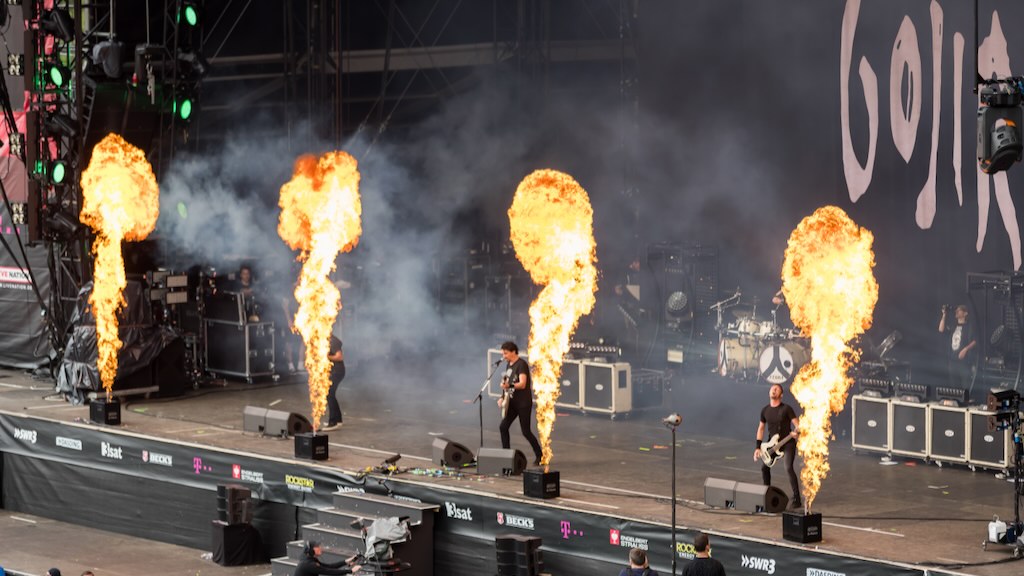Last Updated on October 13, 2021, 12:18 PM | Published: October 12, 2021
Heavy metal has always been defined by an infatuation with death, violence, and the darkest aspects of the human experience.
From Black Sabbath summoning visions of witches and black magic to Kiss dressing as demons to Slayer and their reign of blood, metal has become synonymous with the most unsavory tendencies of mankind.
But when Iron Maiden released arguably their most signature hit, “Run to the Hills,” a galloping heavy metal look at the genocide and enslavement of Native Americans, an entire generation of young metalheads began to see the genre as a way to discuss and explore not just the themes of violence, but the historical and societal contexts that often result in it.
French prog-metal stalwarts Gojira have been barreling down that avenue with their most recent effort “Fortitude.” It’s an album-length exploration of the unquenchable thirst for the acquisition, exploitation, and inevitable destruction of seemingly everything by mankind, focusing particularly on indigenous displacement and environmental collapse.
Performing in OKC
Fitting then that the band will be bringing those tragic and terrifying themes with them to the once-Native land of Oklahoma when they take the stage at the Diamond Ballroom this Friday, just four days removed from Columbus Day/Indigenous Peoples Day.
Never strangers to activist lyricism, often focusing on the devastation of climate change, for “Fortitude,” Gojira claims to have been moved to action by the displacement of the world’s indigenous populations, an inspiration that is made explicitly clear in the videos for the album’s lead singles.
“The Chant” focuses on visuals of Tibetan children being driven from their homelands during the Chinese occupation of the late ’40s. The video for the track “Amazonia” showcases the continuing fiery destruction of the Amazon rainforest and the rituals, protests, and violence erupting from the fear and displacement of the Amazonian natives.
Confronting horrors

“Metal has always been an art form for outcasts,” said Stin, bassist for OKC-based experimental metal outfit Chat Pile. “It’s an outlet for those involved to express and explore topics of injustice, corruption, apocalyptic doom, and existential dread. If the best metal helps us confront the horrors of reality, I can’t think of a better topic than environmental collapse.”
But whereas an environmental apocalypse may be the most universal horror facing the world, the ways in which various Native peoples are being affected by climate change are as diverse and complex as the cultures themselves. As a group of four white, French men, Gojira are arguably walking a fine and challenging line between activism and appropriation.
Perspective is key
There might be few people better equipped to consider this issue than Professor Paul Bones, an Associate Professor of Sociology at Texas Woman’s University, an Oklahoman that received a Masters and Ph.D. at OU, and a lifelong, diehard fan of heavy metal. When asked about this question of appropriation versus legitimate activism on “Fortitude,” Prof. Bones was easily able to place the album and its subject matter into the larger context of metal’s history.
“I think violent imagery is a key component of metal,” he told me. “It’s kind of the point, just as a genre that embraces aggression. Indigenous history lends itself to that, and it brings with it authenticity. I would hope that metal would stay away from that kind of exploitation, but I think it’s an easy trap to fall into, and I say this as someone who loves metal and is a big fan of these bands.”
Bones is quick to point out that perspective is key and that many different artists may be using similar historical and cultural imagery, but each for very different reasons.
“For Sepultura, it was an act of reclaiming their culture – going back to their roots – as a rejection of settler colonialism,” Bones says of the legendary Brazilian metal band and their 1996 classic “Roots,” itself an exploration of the Native peoples of the Amazon and its destruction.
“For Iron Maiden, I think it was meant to engage with that ‘cowboys and Indians’ imagery that has defined Western boyhood. It was a musical play, which if you’ve ever seen Maiden live, you know that fits. For Gojira, I think it is a legitimate attempt to draw attention to a worthy cause and pay tribute. But I’m not sure how well that comes off in 2021.”
Following through
In order to pay that tribute, and to supersede any accusations of appropriating the plight and struggle of indigenous cultures just for the sake of violent or aggressive subject matter, Gojira have put their money where their mouths are. The band has pledged the proceeds from the “Amazonia” single to the organization The Articulation of Indigenous Peoples of Brazil.
“This is a call for unity,” says Gojira vocalist Joe Duplantier in a press statement. “The music community can be powerful when united towards something meaningful like this.”
You can experience that unity and meaning, all wrapped up inside some of the most blistering and rhythmically technical metal around, this Friday at the Diamond Ballroom.
Check out diamondballroom.com for information, supporting acts, and health and safety info regarding Covid-19 policies.
Brett Fieldcamp has been covering arts, entertainment, news, housing, and culture in Oklahoma for nearly 15 years, writing for several local and state publications. He’s also a musician and songwriter and holds a certification as Specialist of Spirits from The Society of Wine Educators.











